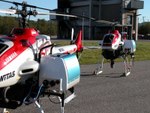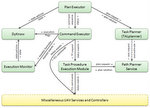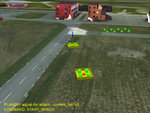Knowledge Representation and Decision Support
[Knowledge Processing Lab, UASTechnologies Lab]
Fill in!
Stream-Based Reasoning
[Knowledge Processing Lab, UASTechnologies Lab]
Today's world generates an unprecedented and every-increasing torrent of data. For example, there were an estimated 3.7 million Google search queries per minute in 2018. But it is not just data on the Internet that is associated with rapidly increasing volumes; CCTV cameras produce image data 24/7 and have been keeping an eye on the City and elsewhere. Likewise, autonomous vehicles like cars or unmanned aerial vehicles produce high-velocity streams of data. Making sense of these streams requires the ability to incrementally reason over rapidly-changing information, not just to update models and draw conclusions, but also to decide what data to pay attention to and what data to ignore in the pursuit of a goal. Stream reasoning is therefore an important and broad research area that has overlap with areas such as knowledge representation and reasoning, the semantic web, and machine learning. DYKNOW is a stream-based reasoning framework developed in AIICs that deals with many of the issues considered above and applied in AIICS autonomous systems research, among other other applications.
» Read more about Stream-Based Reasoning!
Execution Monitoring
[Knowledge Processing Lab, UASTechnologies Lab]
The execution monitoring project aims to develop methods for detecting and classifying failures during plan execution, regardless of whether those failures result from mechanical problems, incorrect assumptions, or interference from other agents. For this purpose, TALplanner has been extended to allow the intended behavior of actions and plans over time to be specified as formulas in Temporal Action Logic (TAL) and to automatically extract such information from planning domains. At execution time, knowledge gathered from sensors is used by DyKnow to incrementally build partial logical models representing the actual development of the system and its environment over time. Violations of intended behavior are detected in a timely manner using formula progression.
» Read more about the Execution Monitoring project!
TAL: Temporal Action Logics
[Knowledge Processing Lab]
The Temporal Action Logic (TAL) project focuses on modeling and reasoning about dynamic processes which arise due to interactions between physical or software artifacts and the complex dynamic environment in which they are situated, or among several physical artifacts situated in similar environments. The environments of interest may be characterized by the inability to provide complete representations of their dynamics due to their complexity.
The project includes development of temporal logics for reasoning about action, change and processes; the development of inference techniques for use in robotics systems; the development of visuallization tools to support this type of research; the application of temporal logics to planning, prediction, explanation and diagnosis; and development of tools to support the structuring of large narrative applications using object-oriented techniques.(Group: KPLAB)
» Read more about the TAL project!
TALplanner
[Knowledge Processing Lab, UAS Technologies Lab]]
TALplanner is a forward-chaining planner based on the use of rich domain knowledge in Temporal Action Logics (TAL) to constrain and prune the standard forward-chaining search tree. TALplanner can generate both concurrent and sequential temporal plans and has support for metric resource constraints. Plans can be annotated with constraints to be tested at execution time by an execution monitoring system, implemented as part of the DyKnow knowledge processing middleware service. The planner implementation is in active use in the UASTech UAV project and also serves as a basis for new research in extending the expressivity of plans and domain knowledge.
QET: Quantifier Elimination Techniques
[Knowledge Processing Lab]
Just as there are a number of techniques which reduce sentences in fragments of 1st-order logic to equivalent sentences in propositional logic via the application of quantifier elimination techniques, there are also quantifier elimination techniques which may be applied to reduce sentences in fragments of 2nd-order logic to equivalent sentences in 1st-order logic. Such techniques are studied in the Quantifier Elimination Project (QET). (Group: KPLAB, SCML)




